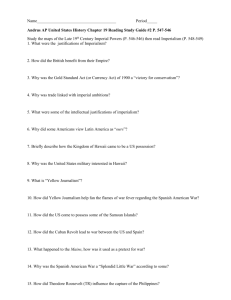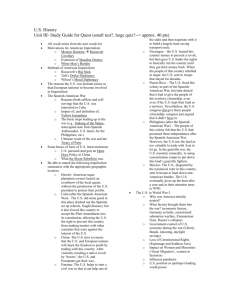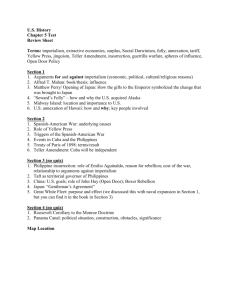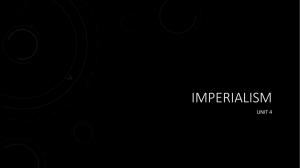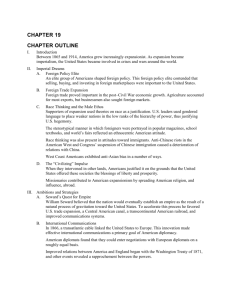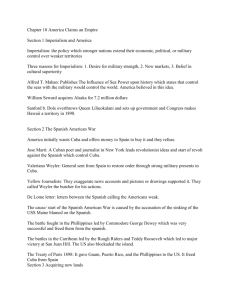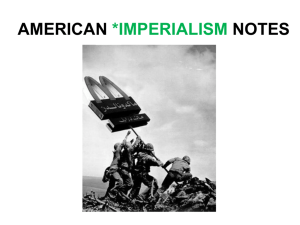Chapter 10: America Claims an Empire
advertisement
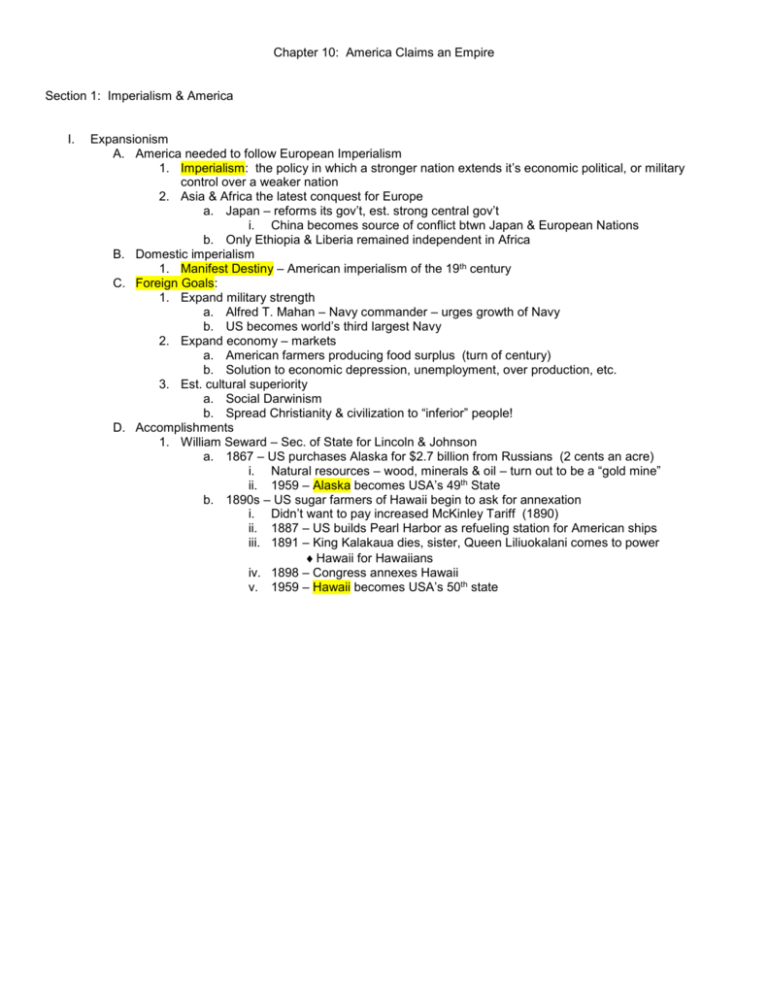
Chapter 10: America Claims an Empire Section 1: Imperialism & America I. Expansionism A. America needed to follow European Imperialism 1. Imperialism: the policy in which a stronger nation extends it’s economic political, or military control over a weaker nation 2. Asia & Africa the latest conquest for Europe a. Japan – reforms its gov’t, est. strong central gov’t i. China becomes source of conflict btwn Japan & European Nations b. Only Ethiopia & Liberia remained independent in Africa B. Domestic imperialism 1. Manifest Destiny – American imperialism of the 19th century C. Foreign Goals: 1. Expand military strength a. Alfred T. Mahan – Navy commander – urges growth of Navy b. US becomes world’s third largest Navy 2. Expand economy – markets a. American farmers producing food surplus (turn of century) b. Solution to economic depression, unemployment, over production, etc. 3. Est. cultural superiority a. Social Darwinism b. Spread Christianity & civilization to “inferior” people! D. Accomplishments 1. William Seward – Sec. of State for Lincoln & Johnson a. 1867 – US purchases Alaska for $2.7 billion from Russians (2 cents an acre) i. Natural resources – wood, minerals & oil – turn out to be a “gold mine” ii. 1959 – Alaska becomes USA’s 49th State b. 1890s – US sugar farmers of Hawaii begin to ask for annexation i. Didn’t want to pay increased McKinley Tariff (1890) ii. 1887 – US builds Pearl Harbor as refueling station for American ships iii. 1891 – King Kalakaua dies, sister, Queen Liliuokalani comes to power Hawaii for Hawaiians iv. 1898 – Congress annexes Hawaii v. 1959 – Hawaii becomes USA’s 50th state Section 2: The Spanish-American War I. Cuba Rebels A. Spain’s foreign influence was shrinking 1. 1880s – controlling Philippines, Guam, Cuba & Puerto Rico 2. 1868, 1878, & 1896 Cuba rebels again Spanish rule B. US interest in Cuba 1. 90 miles from FL 2. 1854 –US offers to buy Cuba from Spain 3. 1886 – US business invests in Cuban sugar cane industry C. Spanish-Cuban War 1. 1896 – Jose Marti leads Cuban revolt against Spain 2. Spain sends Gen. Weyler to squash rebellion a. Est. concentration camps for rebels b. American newspapers sensationalize the event 3. Pres. McKinley seeks diplomatic end to dispute a. Spain recalls Gen. Weyler, offers self-gov’t b. De Lome (Spanish foreign minister) letter leaked to US Press i. McKinley accussed of being weak & seeking attention 4. USS Maine explodes (Feb. 15, 1898) a. Sent to retrieve American citizens in fear of their lives b. 260 killed in unexplainable explosion c. American newspapers accuse Spanish of attacking the Maine i. Coin the phrase: “Remember the Maine” II. US & Spanish War A. Public opinion leads McKinley to ask for authorization of War 1. Congress declares war on April 20th, 1898 B. Two front war 1. Philippines a. Commodore G. Dewey attacks Spanish in the port of Manila b. US destroys nearly entire Spanish fleet c. US ground forces join Filipinos 2. Caribbean a. Admiral W.T. Sampson est. naval blockade of Cuba b. 125,000 volunteers lead invasion of Cuba i. Had not faught since the Civil War ii. Ill prepared, ill suited iii. TR & the Rough Riders TR resigns post as Asst. Sec. of Navy in order to see some fighting Win vitories at Kettle Hill and San Juan Hill Newspapers sensationalize TR’s & Rough Riders role c. Spanish fleet tries to flee i. US destroyes d. With victory in Cuba, US invades Puerto Rico in July C. Treaty of Paris 1. McKinley uses Christian cultural superiority as reasoning for annexation of Philippines Section 3: Acquring New Lands I. American Imperialism A. Puerto Rico 1. Gen. N.A. Miles: “America is her to bring you protection and the blessings of the liberal institutions of our gov’t” 2. US Military controls until Congress acts 3. Foraker Act est. Puerto Rico’s gov’t a. Pres of USA to appoint Gov. & Senate members to Legislature b. Citizens to elect HoR members B. Cuba 1. Platt Amendment a. US Gov’t wants Cuba to add to it’s Constitution i. The US has the right to intervene in Cuba ii. Cuba must have a balanced budget iii. US could buy/lease land for naval bases b. US Army wouldn’t withdraw until the Amendment wasn’t adopted 2. Business interests a. Sugar, tobacco & mineral resources C. Philippines 1. Filippino-American War a. Feb. 1899 – Filipinos revolt against USA b. Costs US gov’t $400 million to fight & 4,000 lives c. Aftermath i. Same gov’t set-up as Filipines ii. To obtain independence in 1946 D. China 1. Philippines the gateway to much more prosperous China 2. John Hay, Sec. of State, issues Open Door Notes (1899) a. Letters to fellow imperialistic nations (European) b. Sought to “share“ trading rights in China 3. Boxer Rebellion a. Europeans come to dominate Chinese cities by turn of century i. Boxers, Chinese nationales, pledege to get Europeans out of China b. US joins coalition forces to root out Boxers 4. Hays issues second set of notes following the success of the rebellion a. US would “safeguard for the world, the principal of equal and impartial trade with all parts of the Chinese empire.” E. Lasting Legacy of Imperialism 1. McKinley’s relection serves as approval of imperialism a. W.J. Bryan was anti-imperialism 2. Anti-Imperialst League forms a. Former Pres. Grover Cleveland, Andrew Carnegie, Jane Addams, Mark Twain all join b. Wrong for US to control another country without their consent Section 4: America as a World Power I. TR & Diplomacy A. Japan exerting its influence in Asia Panama Canal Roosevelt Corollary Dollar Diplomacy


